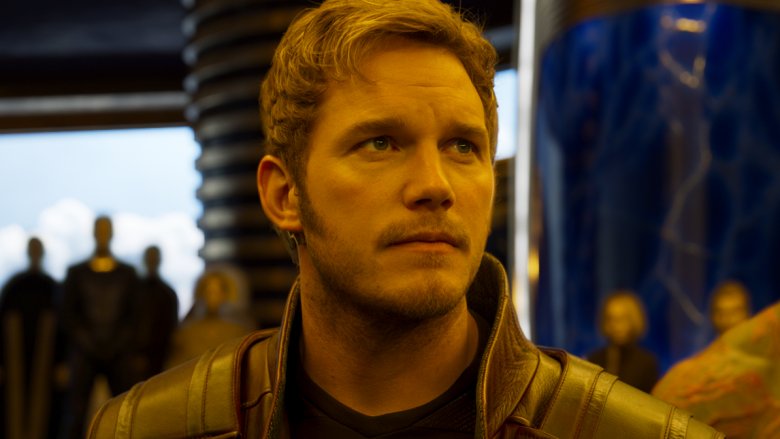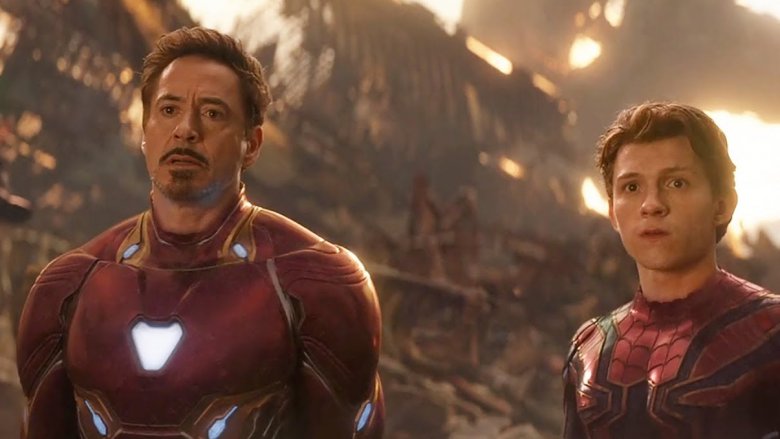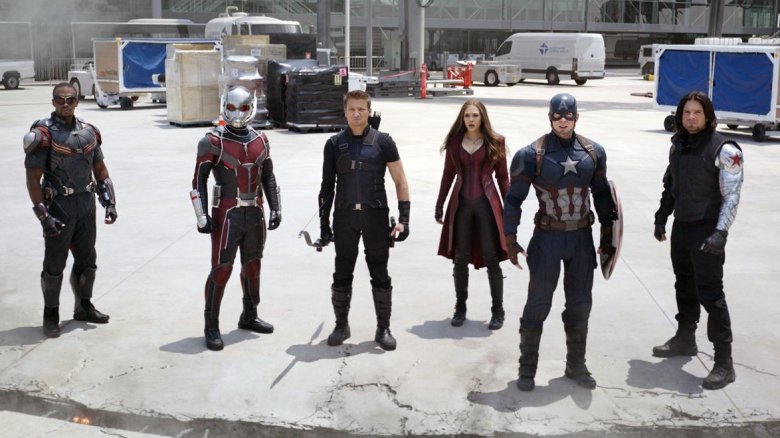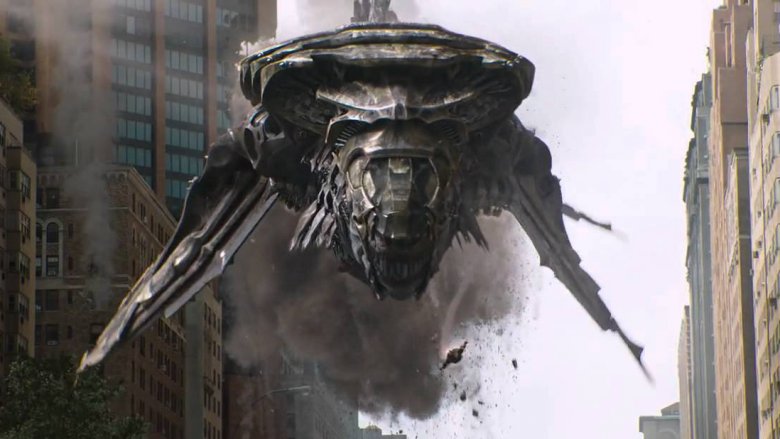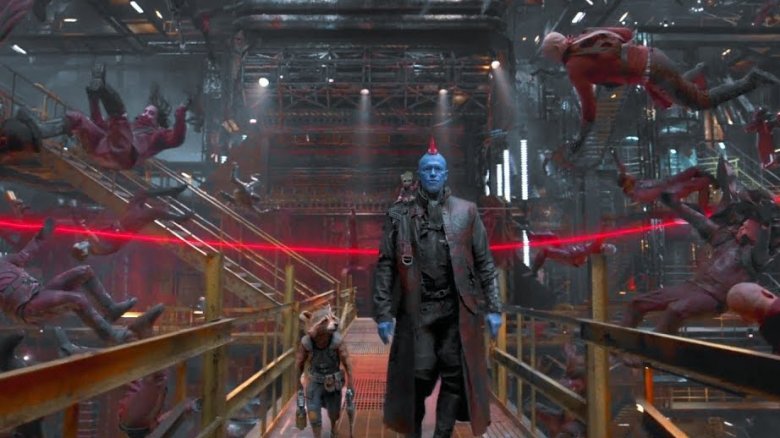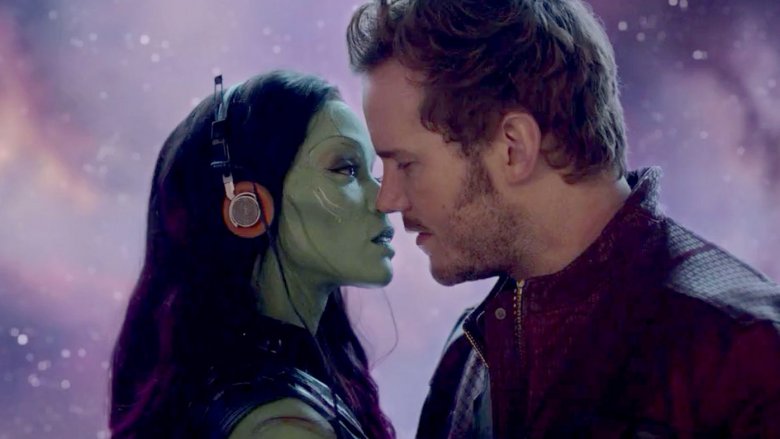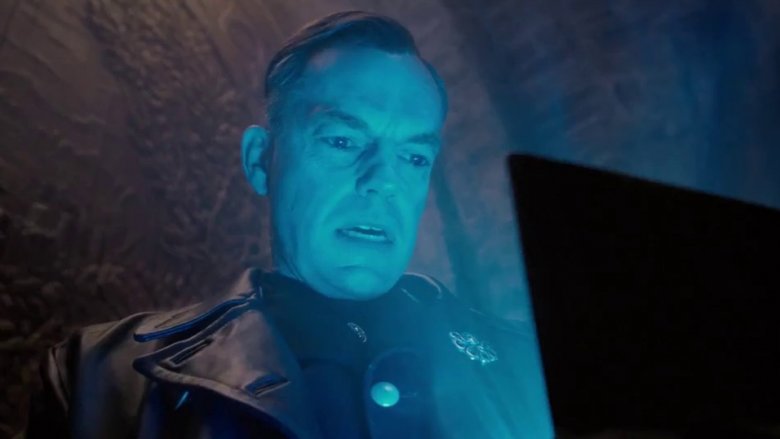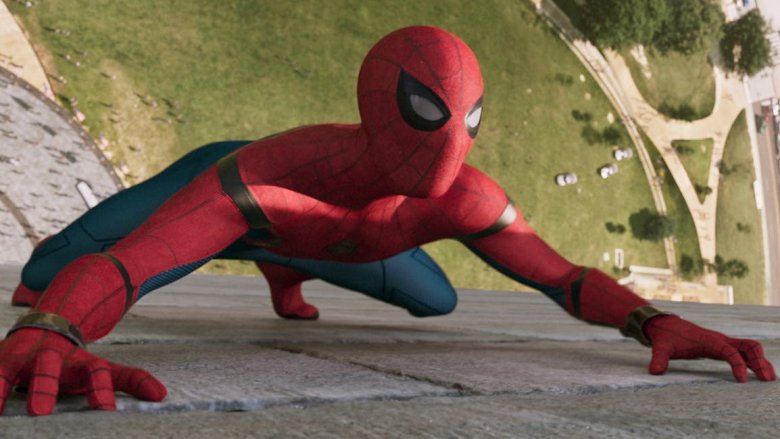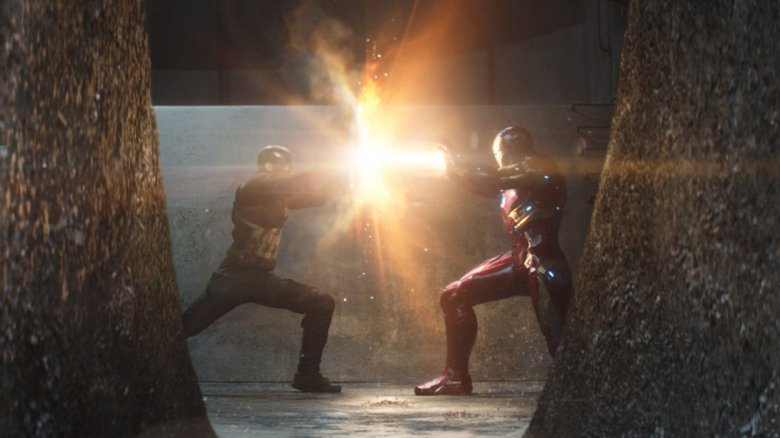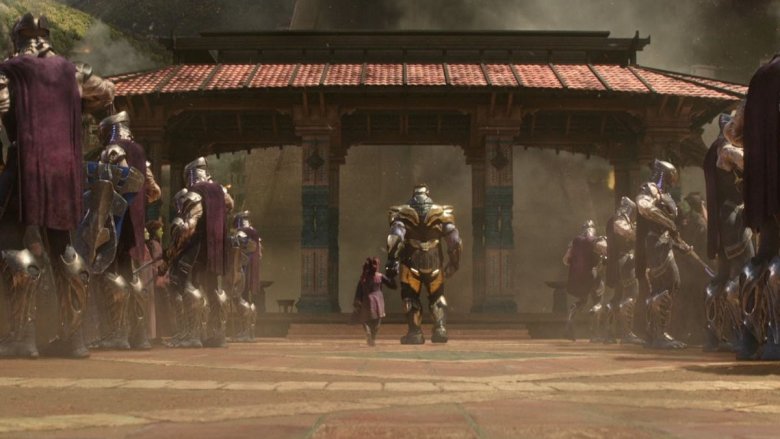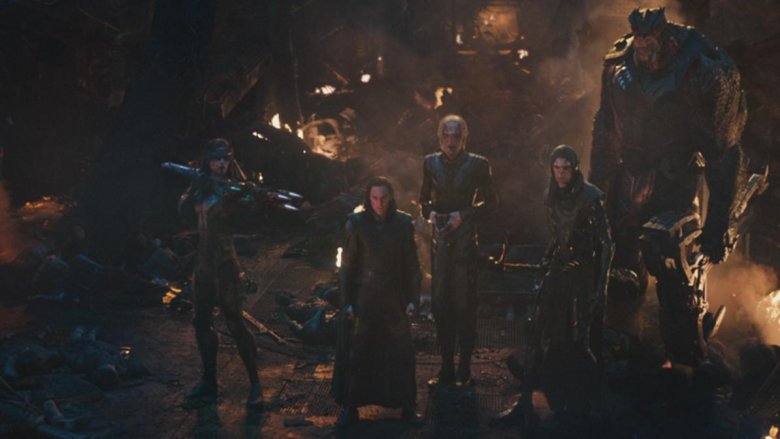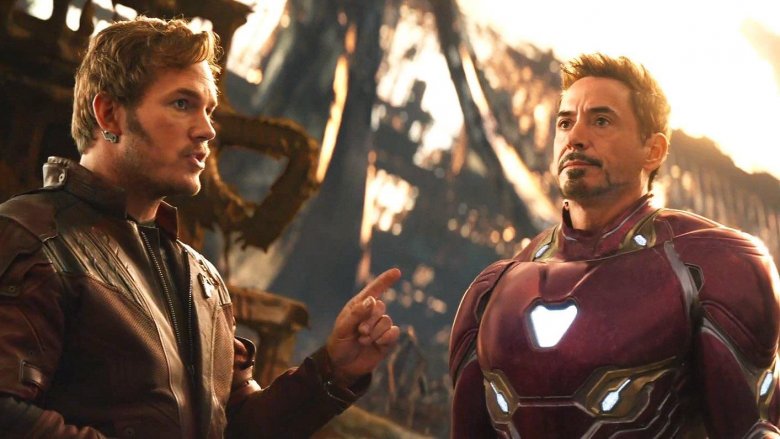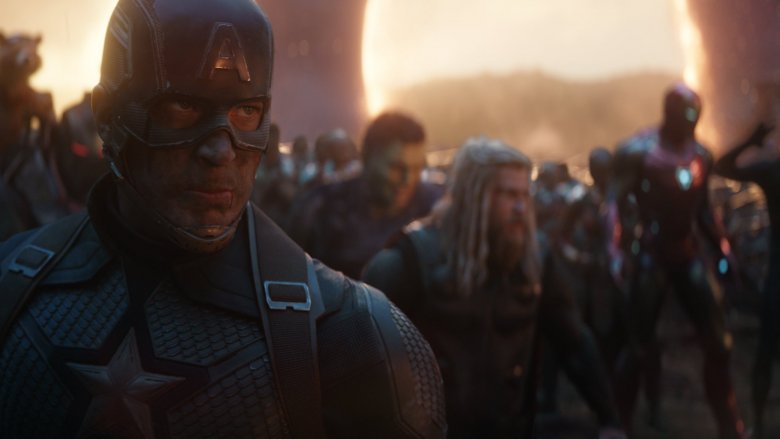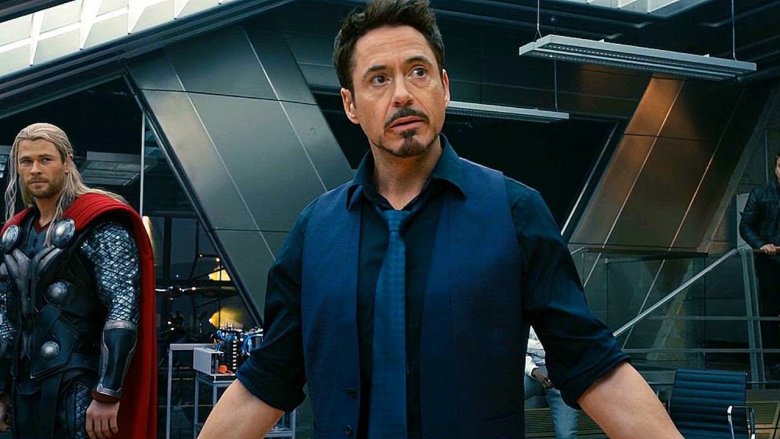Things In The MCU Only Adults Notice
The Marvel Cinematic Universe has been a fun ride for the last decade and change. The endless action, compelling story arcs, and a stream of quality crossovers have kept audiences coming back for more on a regular basis. One of the best things about being an MCU enthusiast is its generally family-friendly nature, which allows life-long adult super fans to bring their prepubescent kids along with them to the theater each time a new title drops.
Of course, while kids absolutely adore Marvel movies, there's a lot about this franchise that only grown-ups will appreciate, like maybe a bit of adult humor here and there. On the flip side, occasionally something a little wonky might happen on-screen that wouldn't bother a child but might drive an adult insane. From tacky outfits and glossed-over casualties to an incessant barrage of quick-witted innuendos, here are some things in the MCU that only adults will notice.
Intergalactic travel is no big deal in the MCU
When it comes to superhero movies, we all need a little bit of suspended disbelief. Obviously, no one is going into a Marvel movie these days looking for a dose of realism. That said, one area where the producers have been a bit lackadaisical is in the form of believable space travel. At this point, a fair number of Terrans (aka humans) have been been shown making trips through space. Sometimes this looks very real like when Tony Stark nearly died from lack of oxygen or when Peter Parker had to be saved as the flying donut headed out of orbit.
At other times, though, the entire issue of being in space or on an alien planet is completely ignored. For instance, when Stark and Parker get to Titan in Avengers: Infinity War, everything seems normal. They can breathe fine without their masks. Star-Lord, another human, also joins them and seems unaffected. We see this again in Endgame, when War Machine heads to Morag and is perfectly fine. From there, Clint Barton and Black Widow jaunt on over to Vormir, where everything is hunky-dory, physiologically speaking. Even in Thor: The Dark World, Jane Foster is totally okay wandering around Asgard as if it's just another continent on Earth. While a lot of time is spent explaining phenomena throughout the MCU, space travel seems to be one that gets left in the dust on a regular basis.
Those darned power levels
In most of their films, the Marvel masterminds have managed to craft fairly believable storylines within the context of unbelievable settings. Captain America: Civil War, for instance, centers on a very realistic showdown between leaders, even if it involves flying androids, robotic suits, supersoldiers, and the like. In spite of it all, the serious tone of the film draws the audience past that "disbelief."
But that doesn't change the fact that many of the struggles taking place throughout the MCU are ridiculously lopsided. Take the fight with Thanos on Titan, for instance. Endgame shows us a villain that can hold his own without the Infinity Gauntlet, even against the likes of Captain Marvel. And yet, the Mad Titan, fully-gauntleted no less, has to fight characters like Drax and Spider-Man for several minutes before gaining the upper hand in Infinity War.
Another way to look at it is through the lens of the Avengers themselves. The power balance on the team is insanely off-kilter. On the one hand, you have physically restricted characters like Black Widow and Clint Barton. On the other, you have Vision, Thor, and even Hulk and Scarlet Witch, whose power sets scale infinitely for all intents and purposes. While Marvel does a good job layering them all into one believable storyline, the truth is, it's just hard to believe this same group of people could ever truly function shoulder to shoulder in real life.
Marvel is weird about collateral damage
Battles in the MCU are a dime a dozen. It doesn't matter if you're witnessing the epic climax of the film, an early skirmish with a villain to set the stage, or even a fight between the heroes themselves, combat is part and parcel for any Marvel movie. However, the effects of those battles tend to be all over the board.
Sometimes the collateral damage of a battle plays an important part of the story, as is the case for the destruction of Sokovia and the duel of Johannesburg in Avengers: Age of Ultron. In fact, those particular fights were highlighted for the death toll and damage inflicted upon poor civilians. Earlier in the film, Iron Man even takes the time to check if anyone is present in a half-finished South African skyscraper before using it to finish his little tête-à-tête with Hulk.
But for every scene like this, there are a dozen that don't try in the least to take the side effects into account. The Battle of New York in Avengers, for instance, had to cause a ridiculous number of casualties. And yet, all we see are Chitauri soldiers being vaporized right and left. Every time Hulk smashes in any movie, cars go flying, Helicarriers get damaged, and buildings crumble without any thought to who might be in their path. And what about Thor? Every time the god of thunder summons Mjolnir, to the crashing glee of every viewer, we have no idea how many poor souls were in its path.
All the casual deaths in the MCU
When it comes to killing, the MCU often treats death and violence as lighthearted entertainment. That's not to say that they don't seriously address death from time to time. The Sokovia accords are a huge deal, Thanos wants to wipe out half of the universe and must be stopped, and so on. But there are several areas where death becomes as casual as breathing.
For example, Tony Stark kicks off his superhero career by reigning hellfire and destruction on the Ten Rings. Hulk literally strangles and smashes everything in his path. And Thor? The dude brags about his kill total on a regular basis. Perhaps the best depiction of the brazenly casual view of life comes in Guardians of the Galaxy Vol. 2. After being betrayed by his entire crew, Yondu breaks out of prison and uses his Yaka arrow to kill every single mutineer (okay, Rocket and Groot help a little). One scene in particular shows dozens of men falling in slow motion, all pierced through the heart by the feisty red arrow. While it has a dark humor to it, there's no denying the chilling morbidity of the cold-blooded scene.
Marvel has some awesome needle drops
Music is an important part of the filmmaking process, and a solid needle drop is something any adult audience will appreciate. Fortunately, there's a constant string of beloved classics popping up throughout Marvel movies. Captain Marvel is brimming with 90s classics like Nirvana's "Come as You Are" and No Doubt's "Just a Girl." Thor: Ragnarok was actually built around Led Zeppelin's "Immigrant Song." And then there's Guardians of the Galaxy. Every time Star-Lord fires up his cassette deck, there's only a select number of viewers under the age of 18 that are going to have any idea what that contraption is, let alone how it works. And what about the tape inside it? "Awesome Mix Vol. 1" is loaded with classics like Blue Swede's "Hooked on A Feeling," The Jackson 5's "I Want You Back," and David Bowie's "Moonage Daydream," all of which are a half-century old at this point. While there are modern songs sprinkled throughout, the MCU certainly has its fair share of older musical compositions that go in one ear and out the other for most younger viewers.
Adults get the oldschool cinema of the MCU
Classic movie references come hot and heavy in the MCU, too. Star-Lord claims Footloose was the greatest movie in history. Peter Parker reminds everyone about "that really old movie" The Empire Strikes Back. Tony Stark calls Thor Point Break and The Big Lebowski, and Captain Marvel features a Blockbuster littered with 90s movies of all genres and titles.
Sometimes the references are more directly woven into the context of the scene. This is the case early on in Captain America: The First Avenger when Red Skull recovers the Tesseract and mockingly says to himself, "The Führer digs for trinkets in the desert." The line pretty clearly is talking about the first and third films of the Indiana Jones franchise, which focused on Nazis searching for "trinkets" like the Ark of the Covenant and the Holy Grail. The older cinematic shout-out is an MCU regular at this point, and it's one that's very likely to go over the heads of most younger viewers (except for the ones whose reflexes are too fast and will catch them).
Those superhero outfits are ridiculous
Pretty much everyone is used to seeing superheroes flash across the screen these days. But that doesn't change the fact that their outfits are often straight-up ridiculous. We're not saying they look bad. In fact, the MCU without superhero garb would be a drab, colorless place. However, that doesn't change the fact that actors in Marvel movies often have to don the most outlandish apparel of their entire careers. It's a fact that has led to many comments from the actors themselves, like Tom Holland's remark about how the stealth suit for Spider-Man: Far From Home was great because he was actually able to go to the bathroom while wearing it.
While we're on the subject of the MCU wardrobe department, there's also that nit-picky little observation that superhero clothing often doesn't wear out during battle. After tussling with a horde of Thanos' minions in Infinity War, Captain America's clothes look little worse for the wear. Captain Marvel lights up from top to bottom and then flies through a freaking space ship, and yet her clothes don't change a bit. Somehow, Hulk's pants never rip off. These are the wardrobe malfunctions of the MCU that only an adult's critical, sarcastic eye could catch.
The entire Captain America: Civil War conflict isn't for kids
Captain America: Civil War is a great movie. It's filled with cameos and action sequences that mesmerize audiences, regardless of age. It also pretty much functions as "Avengers: 2.5" in the story department, as the team goes through the fallout of Avengers: Age of Ultron...and that's the point where you tend to lose the kids. The entire plot of the movie is extremely dense and filled with a nuance that few other Marvel films ever even hint at.
While a youngster's going to enjoy watching the airport battle in Germany, there's little chance they're going to fully understand the scope of what it means for the Avengers to really, truly come to blows. Watching Tony Stark and Steve Rogers argue back and forth about whether or not to submit themselves to the authority of a government entity is tricky business, too. The Sokovia Accords, which addresses the dramatic destruction that the team participated in during Age of Ultron, is also serious stuff. As the story unfolds, many of these grave issues quickly drop to the background, left to be noticed by the adults as they're covered up by the flash and glamour of Avengers trying to punch each other in the face.
Marvel's got a whole lot of genocide going on
The concept of wiping out entire races, planets, and universes comes up more than once in the MCU. Kids are given a quick taste of it in Infinity War, during the scene on Gamora's planet, but it's shown from her childlike perspective. Even Thanos' whole "wipe out half of the universe" schtick, which takes front and center throughout the last two Avengers movies, leaving a sense of innocence to the whole affair. The truth is, though, genocide is a pretty common occurrence in the MCU, even if it's only brought up in sidebar conversations and small hints that only the adults typically catch.
In Avengers: Infinity War, Thanos is reported to have decimated Xandar, and that's after Ronan the Accuser came horrifyingly close to obliterating it entirely in Guardians of the Galaxy. Malekith tries to wipe out the entire universe in Thor: The Dark World. The Skrulls are being systematically hunted by the Kree in Captain Marvel. Asgard is literally destroyed at the end of Thor: Ragnarok, and the survivors are halved when they bump into Thanos at the end of the film. Heck, in Avengers: Endgame, Thanos even decides that he needs to shred the universe down to its last atom in order to build it again. The concept of annihilating, decimating, and attacking people based on race, creed, or even mere existence is a constant refrain within the MCU.
Thanos is a really bad dad
No one can watch Avengers: Infinity War or Avengers: Endgame and miss the fact that Thanos is a bad guy. That's plain as day. But the fact that he's a bad dad is a bit harder to pick up on. Sure, his "children," the Black Order, look to him as their father figure, but the entire situation is about as warped and perverted as only an adult could fully notice.
Clothing himself in a "holy warrior" persona, the Mad Titan fosters a team of generals that look to him as children do to their parents, with the notable exception that this parent insists they go out and massacre innocent people. And then there's the fact that in the name of "improvement," he literally dismembers and tortures Nebula to make her a better weapon. (Er, did we say weapon? We meant daughter.) No matter what way you slice it, Thanos' parental relationship with his top commanders is warped, twisted, and flat-out wrong.
Marvel has innuendos galore
The benchmark of "things only adults notice" is, of course, innuendos. Too subtle for a kid to pick up on, but all too obvious for an experienced adult, innuendos are the bread and butter of MCU dialogue. There are so many examples for this one, it's hard to count. Of course, a huge number of them stem from two specific people: Peter Quill and Tony Stark.
For instance, Star-Lord kicks off Guardians of the Galaxy Vol. 2 by explaining that he loves making babies the old-fashioned way and would love to teach the High Priestess Ayesha the art. Even that one's not as bad as a scene from the first film of the Guardians franchise, when Star-Lord says that his ship would look like a Pollock painting under a black light.
And then there's Tony Stark. The sarcastic ex-playboy always has a clever retort or comment. Take, for instance, when he heckled Hulk and Black Widow in Avengers: Age of Ultron, asking if they were playing "hide the zucchini." And then there's the time Clint Barton tried to lift Mjolnir, and Stark jibed that it had been a long day and, "We won't hold it against you if you can't get it up." In the same scene, he announces that if he can lift the hammer himself, he'll be reinstituting "prima nocta," which...well...we'll assume everybody's seen Braveheart before. When it comes to the MCU, there seems to be an innuendo behind every corner.
Thanos is way too patient with his enemies
One of the more nit-picky things that only adults would typically notice comes at the end of Avengers: Endgame, as Thanos' army prepares to steamroll over the lone Steve Rogers who stands in their way. Suddenly, everyone stops in wonder as dozens of sling ring portals open up, delivering a host of allies from all over the universe. The excitement is intense, as the host of good guys pour onto the battlefield, line up nice and neatly side by side as if they trained together, and then suddenly rush forward after Captain America whispers "assemble."
First off, since when is "assemble" a queue to run headlong at an enemy army? Secondly, how on earth did everyone hear it? Even if you excuse those two things for the sake of an epic scene, there's still the problem of Thanos. The big purple guy just sits their, watching and waiting patiently for his enemies to unite. One gets the feeling he would've let them sit down to a picnic lunch first if they'd asked. While the scene on its own merits is one of the most epic moments in the entire MCU, it certainly has a couple of odd elements that tug at that suspension of reality.
Tony Stark's entire story is for adults
Tony Stark's entire story is built around some very adult-oriented themes, many of which are glossed over by younger viewers in favor of the bells and whistles of the Iron Man armor. But when you stop to think about it, there's very little about Tony Stark's story that doesn't appeal directly to adult viewers.
The man started as a playboy who was constantly womanizing, spouting inappropriate jokes, and drinking without a care in the world. He treated people like garbage and didn't blink twice at the moral struggle of living off of a fortune built on dealing weapons. And as his personality was tempered into one of the greatest superheroes in the entire universe, his story remained just as adult in nature. He took on terrorists more than once and ultimately came to play a key role in Captain America: Civil War, where he advocated for the group to be put under government control. After that, his inner struggles continued until he took on Thanos and ultimately sacrificed himself by for the good of literally the entire universe. Without a doubt, the quantity of high-minded, adult level material in the Stark storyline is overwhelming.
